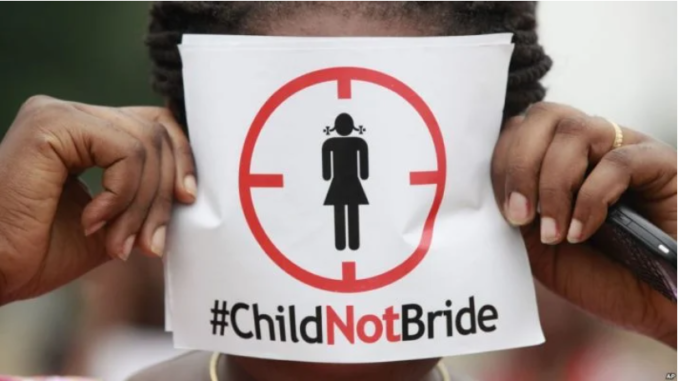
NIGERIA’S disgraceful scorecard on the plight of the girl-child was re-enacted with a new report from Save the Children International that 48 per cent of girls in the northern part of the country are married off before age 15. The precise regions affected are the North-East and North-West. The report, titled, ‘State of the Nigerian Girl: An incisive diagnosis of child marriage in Nigeria,’ notes that 78 per cent of girls in the regions were married by age 18. It adds that an estimated 44 per cent of girls in Nigeria get married before their 18th birthday. This is a piece of demographic baggage in the country.
Similarly, the United Nations Children Education Fund captured the quandary when it revealed that Nigeria has the largest number of child brides in Africa, with about 23 million girls and women married as children. Earlier, UNICEF had stated that Nigeria lost $8.9 billion annually to violence, child marriage and harmful practices affecting women and girls.
Apart from its negative consequences on fertility, health, and wellbeing, child marriage has far-reaching macroeconomic and sustainability consequences for the country. Explicitly, child marriage has devastating effects on the girl-child, says Save the Children, an NGO.
The United Nations Population Fund says complications relating to pregnancy and childbirth are the leading causes of death for 15-19-year-olds. Strikingly, it increases the chance of intergenerational poverty. A country and the family unit benefit immensely from the education of the girl-child, but they stand to lose immeasurably by raising an army of illiterate child-brides. It is a reality that an educated girl-child makes informed decisions, raises fewer kids, and expands self-development and self-interactions. The educated girl-child strengthens the family bonds and ensures a cycle of healthier families, which translates to a prosperous society.
Governors across states in Nigeria, especially in the North, where child marriage is widespread, should be alive to their responsibilities by encouraging far-reaching legislation to criminalise it and protect victims from its ruinous health consequences.
Particularly, child marriage exposes victims to cervical cancer, obstetric fistula and risk of premature births and deaths, including losing their lives during childbirth. These realities are sufficient to provoke any forward-looking governor to action in a bid to shield the girl-child from antiquated harmful traditional practices and diverse abuses inherent in early marriage. It is instructive to tell the promoters of underage marriage in the mould of the young or elderly; super-rich, lawmakers or religious leaders that they are setting bad examples. It should be restated that minors have no emotional or personal consent for marriage, and it is also invalid even if it is conducted through parental consent.
A former governor of the Central Bank of Nigeria, Sanusi Lamido, captured the monster termed underage marriage and its uncontrolled negative effects on progress in the North when he said, “It is not a mere coincidence that this is where you have the highest levels of illiteracy, early marriage, divorce and the highest levels of domestic violence.” He added, “People need to understand that the law has to change. If you look at the medical data on maternal health, girls who get pregnant below the age of 15 are five times as likely to die as girls who get pregnant at the age of 20. Those who get pregnant under 18 are twice as likely to die as those who get pregnant at the age of 20. So, we must look at this issue of early marriage.”
Nigeria should have joined the rest of the world to combat problems hindering the growth of the girl-child. But it delays at every opportunity to engender quality change. The country adopted the Child Rights Act in 2003 at the national level, but till now, UNICEF notes that only 25 of the 36 states have domesticated the law, which is the national legal framework for child protection. It is disturbing that many of the states that had domesticated the Act are lax on implementation, thereby encouraging sustained barriers to the capacity of the girl-child to attain her full potential.
Experts have broadly noted that child marriages expand birth rates and population explosion, thus frustrating the government’s effort in sustainable development. Worldwide, an estimated 650 million girls and women living today got married in childhood, with about half of the incidents linked to Bangladesh, Brazil, Ethiopia, India, and Nigeria.
States mostly affected should do more than lament about the plight of the girl-child subjected to early marriage. They should purposely end the reign of impunity in turning minors into brides and support solid laws against those with an incurable proclivity for the underage. The Deputy Governor of Gombe State, Manassah Jatau, lamented increasing cases of child marriage in the Konfulata community within the Kwami Local Government Area of the state. Beyond bewailing the unbridled cases of early marriage in the LGA, the government must show its disapproval for such a despicable act by domesticating the CRA and absorbing connected laws to deter promoters of underage marriage. In India, the government gives families a cash sum on their daughters’ 18th birthday, providing she had not yet been married.
Girls are unique in varied ways and their unmatched inputs are remarkable in families, societies, and economies.
Education remains the most potent instrument to keep child-marriage numbers down. The longer a girl-child is kept in school, the better her chances of marrying right and well. Nations that prioritise the education of the girl-child advance speedily. In contrast, many of the states in Nigeria that practise child-marriage battle gross underdevelopment in critical sectors. Backed fully by enabling laws, especially UBE and Child Right Acts, the state governors should mobilise all segments of society to end this unwholesome practice.
END

Be the first to comment